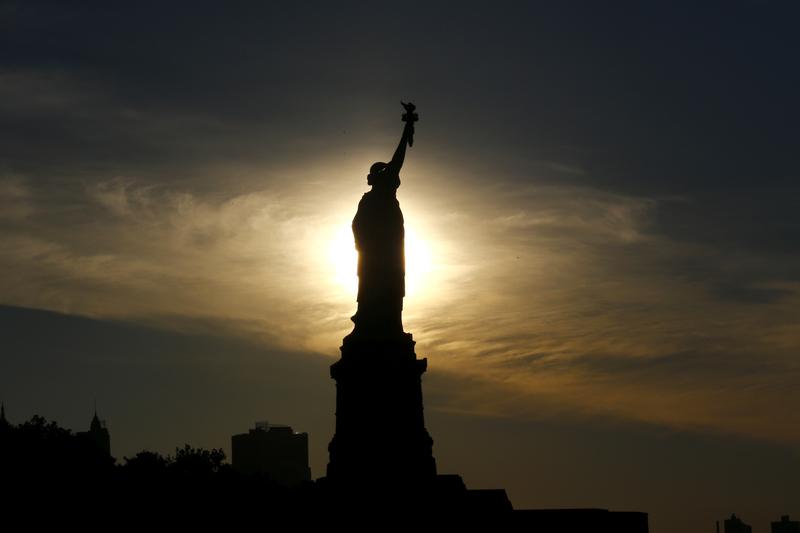
This episode is from the WNYC archives. It may contain language which is no longer politically or socially appropriate.
"Send these, the homeless, tempest-tossed, to me," the announcer quotes in the introduction, referring to the title of the program—the Golden Door. He introduces the cast: Edith Atwater and Harold Huber star in this docudrama, which is written by Milton Robinson. Atwater plays Charlotte Winters, a caseworker for the United Service for New Americans, and Huber is Carl Shartok, a Jewish orchestra conductor who came to America after five years in a concentration camp.
Charlotte Winters begin with a short monolog on her role as a social worker, which means that she must "help to create order where there is disorder, to establish assurance where there is dread, and to aid in adjustment where there is loss." She says that, in the interest of good radio, she will stray outside the bounds of objectivity to give "the type of comment that rarely slips into a case report."
The play begins with Charlotte's narration of Carl Shartok's case, occasionally interrupted by recreations of their therapy sessions. She describes him, "I felt Carl's unhappiness when he sat down. There was a heaviness in the way he moved. A sullen shadow that rested over his eyes. He was a tall man. Well built, with blond hair. His fingers as restless as little animals."
Charlotte tells the listener that the United Service Office found Carl housing, but he was eventually removed from his furnished room because he broke the landlady's radio in a fit of rage. She was playing "The Blue Danube," and it bothered him.
Charlotte cannot figure out what exactly about the piece enrages Carl. Finally, she asks her supervisor for permission to talk to him outside of an office context. They go to a restaurant, when she arranges for violinists to play the song. Carl runs from the place, and Charlotte demands an explanation.
He tells his story, and we flash back to his time at the camp. A German asks him to start an orchestra. At first, he is excited, but during their first concert, he realizes that their music is being used to cover the sounds of the dying as they are killed.
He eventually refuses to conduct, but recordings of their concerts are piped through the camp all the same.
Carl is convinced that his fellow survivors blame him for his role in the camp.
"Carl," Charlotte says, "You've got to understand that there was never any fault in what you did. You've put yourself in a completely false position. Assuming guilt that's not yours. It must be obvious that you had nothing to do with their deaths."
Carl does not believe her, though, so she organizes a party for him. His fellow survivors play the Blue Danube in order to prove to him that they do not blame him. He is rehabilitated.
The play ends, and Edwin Rosenberg, president of the United Service for New Americans, cuts in. He explains the material help that the organization provides for Jewish refugees—meeting them at the boat, economic assistance, job training, housing, and education.
But Carl, he says, is "the living evidence of the tremendous task of human restoration for which the United Jewish Appeal must raise 170 million dollars in 1947." The psychological restoration, he argues, is perhaps the most critical component in the process.
"Happily, we know that the task can be successfully accomplished. That the newcomers, properly assisted, can overcome their psychological as well as their material difficulties and can adjust speedily and thoroughly to American life. The splendid record of refugees who have come in the past is the best evidence of this".
Audio courtesy of the NYC Municipal Archives WNYC Collection
WNYC archives id: 2301
Municipal archives id: LT934
